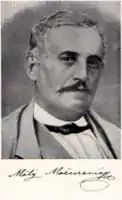Matija Mažuranić | |
|---|---|
 Signed photograph of Matija Mažuranić | |
| Born | 1817 Novi Vinodolski, Croatia |
| Died | April 17, 1881 Feldhof, Austria |
| Occupation | Writer |
| Literary movement | Romanticism |
Matija Mažuranić (1817–April 17, 1881) was a Croatian writer. He was a travelogue writer, and the brother of more noted Ivan, the writer of the well-known epic Smrt Smail-age Čengića.
He was born in Novi Vinodolski and attended a German school in his native town, where he was trained to become a blacksmith. Often he indulged into travels (Montenegro, Serbia), and exceptionally in a few occasions to Bosnia. In 1841 he was back to Novi, practicing his craft and agriculture, but also engaging in literature and cultural issues in general. In 1847 he ended up in Vienna, in 1848 again in Bosnia (in Sarajevo, at the court of Fazli-paša Šerifija). At the end of 1848, in a letter addressed to his brothers he says: "I don't know when I shall return home, for I have been, I'm afraid, created for this country. Turks[1] are very fond of me for my prudence, they say, and rayah grows ever more trust in me, and therefrom there is no other outcome but mitre on the head or a stake in the arse".[2] After Sarajevo, Matija went to Istanbul (though the exact dates cannot be ascertained), and according to some legends even further, to Suez and the Egypt. In 1852 Matija was back to Novi, where he settled until growing ill in 1879. He lived a secluded life until the symptoms of mind degeneration have started to show, finally dying in the sanatorium of a well-known psychiatrist Richard von Krafft-Ebing, in Feldhof near Graz, on April 17, 1881.
As a writer Mažuranić was noted for his travelogue Pogled u Bosnu. During his 1839 travels to Bosnia (from Karlovac, Sisak and Kostajnica, over Belgrade, on foot and horse, to Sarajevo, Travnik, over Romanija up to Zvornik) – Mažuranić wrote a piece which can be read both as an adventure and as a realistic account of the seen and experienced. The travelogue intermixes author's views on the relationships between the Ottoman Turks and the Bosniaks, Islam and Christianity, with accounts of the customs of everyday life, images of vizier courts of agas and pashas, but also of folk meyhanes, contemplations on everyday life, love and death.
Works
- Pogled u Bosnu, ili kratak put u onu krajinu, učinjen 1839—40. po jednom domorodcu, Zagreb, 1842
- Izabrana djela, PSHK, b. 32, Zagreb, 1965
Notes
- ↑ In the 19th century the term Turk (Croatian: Turčin, Turak) could refer both to Ottoman Turks, and to Islamicised Slavs that today refer themselves them as Bosniaks.
- ↑ "Ja ne znam kad ću se povratiti kući, jer sam, bojim se, samo za ovu zemlju stvoren. Turci me jako ljube radi velike mudrosti, kako kažu, a raja sve većma i većma povjerenje u me stavlja, i otud ne more drugo slijediti nego mitra na glavi ili kolac u dupe".
References
- Fališevac, Dunja; Nemec, Krešimir; Novaković, Darko (2000), Leksikon hrvatskih pisaca (in Croatian), Zagreb: Školska knjiga d.d, ISBN 953-0-61107-2